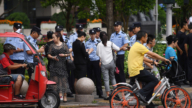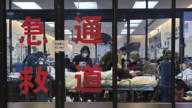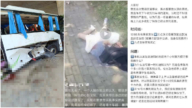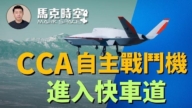【新唐人2011年4月13日訊】今年,中國6244億元的的天價維穩費引發全球的爭議。西方媒體包括《美國之音》、《法廣》電臺、華爾街日報等,以及香港媒體《明報》都進行了報導。最近,中共官方《新華網》針對《法廣》的報導,進行了猛烈攻擊,聲稱中國只有“公共安全”費用,沒有“維穩費”這個說法,指責《法廣》偷換概念、製造噱頭。到底誰在偷換概念呢?我們來聽專家的分析。
在《新華網》這篇署名周繼堅的文章中,一開篇,就否認了中共政府預算中沒有“維穩”這一項。並且聲稱,《法廣》提到的“中國維穩預算”達到6244億元人民幣,其實是“公共安全”支出。
陳志飛(紐約市立大學教授):“『維穩』實際上帶有很濃厚的政治意識形態色彩的,這麼個詞,它明確是傾向於中共維持現在的統治,『公安』其實是一個大家普世公認的一個辭彙,說要維持『公共秩序』,所以中共很難,不太願意把它的『公安』跟『維穏』連在一起,所以它用了『公安』這個詞。實際上它的意義是一樣的,『維穩』的主要力量來自於公安或者武警,那麼從這方面來說呢,我覺得《法廣》沒有犯任何錯誤,而恰恰是中共自己在偷換概念。”
這篇文章還聲稱,中國的“公共安全支出”是隨著財政收入的增長而增長的,並不是像《法廣》所說的,需要應付“嚴重的社會不穩定”局面。
陳志飛指出,中國國家財政收入如果增加的話,急需投入的地方太多了,而不應該用去增加所謂的“公共安全”費用。
陳志飛:“因為我們現在知道,中國的失業率很高,社會福利費用很高,大學生就業很難、看病也很難,為甚麼不把錢投到那些地方去呢?如果去比較一下,那些最需要錢的地方,它的增長幅度遠遠低於中共投的安全或維穩上面的費用。”
《華爾街日報》報導,今年中共兩會發佈2010年預算執行情況報告顯示,去年的「醫療開支」僅佔GDP的1.2%,落後於巴西和南非等同樣是新興市場的國家。
另外,“教育公共開支”佔GDP的3.1%。根據教育部財務司及國家統計局公布的數據計算,中國國家財政性教育經費支出,10年纍計“欠賬”已達16843億元。可是,中國的「公共安全支出」卻一直呈現增長的態勢。
陳志飛:“對它來說,實際上是一個紅朝末世的一個狀態,而根本不是它所說的盛世的一種情況。從這些數據來說,更可以看出,中共內部、社會實際上是不穩定的,而且,人民對它已經沒有任何希望了,造成了它自己所說的維穩的費用日益龐大,達到了不可收拾的局面。”
陳志飛認為,《新華社》指責《法廣》偷換概念,把「公共安全費」視為「維穩費」,其實,恰恰也在指責自己。
陳志飛:“如果這個社會真正穩定的話,它是不在意別人怎麼評價它的。因為沒有美國人會在意中共《人民日報》或者中共別的喉舌天天說美國怎麼怎麼不穩定,因為我們很穩定,沒有人會在乎它說這個。中共爲甚麽會在乎《法廣》這麼說呢?我覺得中共可能道出了天機,就它自己社會太不穩定了。”
《新華網》2010年6月9號,轉載了《光明日報》一篇題為《“天價維穩”的無底洞有多深?》的文章,文章一開始援引《社會科學報》的內容指出,“2009年維穩財政預算執行情況令人震驚:全國內保費用達到5140億元,已接近軍費的數額。”
這篇文章還提到,中國各地近年紛紛成立“維穩辦”、“綜合治理辦”、“應急辦公室”等機構,以致維穩費猛增。
對此,《法廣》表示難以理解,《新華網》為甚麼不批評自己轉發的文章,而偏偏對他們的報導“情有獨鍾”呢?
新唐人記者林平、李靜、薛莉採訪報導。
Changing Facts on Stability Maintenance
China’s astronomical price of “stability maintenance"
this year caused global controversy. Many Western
media reported it, including Voice of America,
Faguang Radio, Wall Street Journal
and Hong Kong’s Ming Pao, Recently, Xinhua,
media of the Chinese Communist Party (CCP)
attacked Faguang, claiming that it was trying
to change the subject to grab attention,
and that China only has “public safety" expenses
instead of “stability maintenance" expenses.
But let’s listen to expert’s analyses to find out
who really is trying to change the subject?
The article from Xinhua, signed by Zhou Jijian,
denies from its beginning the existence of a budget
for “stability maintenance". However, it claims
that the RMB624 billion mentioned by Faguang
is actually a public safety expenditure.
Chen Zhifei (New York City University professor):
“’Stability maintenance’ carries strong political
overtone, and leans to the current safety system.
‘Public safety’ is recognized by the masses.
Chinese authorities do not want to link
stability maintenance and public safety together.
Yet the meaning is the same. Stability maintenance
comes from public security or armed police.
From that standpoint, I think that Faguang did not
make a mistake, but it is the CCP
that tries to change a concept.”
The article also claims that China’s ‘public safety’
expenditure increases due to the growth in financial
revenue, not due to increased social instability.
Chen Zhifei points out that if China’s fiscal revenue
increases, there are many areas needing money.
Why only increase the public safety expenditure?
Chen Zhifei:"We know that China has a high rate
of unemployment, high cost of social welfare,
it’s tough for college graduates to find a job,
there’s lack of health care, so why not invest money
in those areas? In comparison, spending
in those areas would be far lower than that
of ‘public safety’ or ‘stability maintenance’.”
The Wall Street Journal reported that the budget
performance report of 2010 released during
the ‘two meetings’ showed that China’s
medical expenses for 2010 were only 1.2% of GDP,
behind emerging markets of Brazil and South Africa..
In addition, the ‘public education expenditure’
accounted for 3.1% of GDP. According to
the Ministry of Education and Finance and
the National Bureau of Statistics,
China is very far behind in educational spending,
a total of RMB1.6843 trillion for the past 10 years.
However, China’s “public safety expenditure"
has been showing a growing trend.
Chen Zhifei: “This means the end of a state instead
of prosperity. From these data, one can see the society
under the Chinese regime is not stable, but the people
have given up hope for it. Thus, the cost
to ‘maintain stability’ is getting beyond control.”
Chen Zhifei believes that Xinhua accused Faguang
of replacing public safety fee
with stability maintenance fee.
In fact, it also accuses itself at the same time.
Chen Zhifei: “If this society is indeed really stable,
it would not care how others evaluate it.
Americans do not care what People’s Daily
or other mouthpieces of the CCP say,
because we are very stable. So why should CCP
be bothered by Faguang? I say that the CCP
reveals a secret: its society is very unstable.”
On June 9, 2010, Xinhua reprinted an article from
Guangming Daily: “A bottomless pit for ‘stability
maintenance’.” The article quoted content from
Social Science Journal that in the 2009 budget report,
the price of stability maintenance reached
RMB514 billion, close to that of military spending.
The article also mentioned that in recent years,
the Stability Maintenance offices,
Comprehensive Management offices and
Emergency Response offices were all over China,
so that stability maintenance costs soared.
In this regard, Faguang does not understand why
Xinhua did not criticize the article they reprinted
but favored only Faguang’s report?
NTD reporters Lin Ping,Li Jing and Xue Li





























